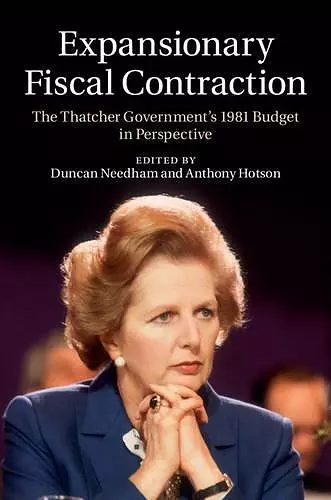Expansionary Fiscal Contraction
The Thatcher Government's 1981 Budget in Perspective
Duncan Needham editor Anthony Hotson editor
Format:Hardback
Publisher:Cambridge University Press
Published:15th Sep '14
Currently unavailable, and unfortunately no date known when it will be back

This unique collection recasts a critical episode in post-war British economic history with profound implications for today's policy makers.
In this specially commissioned volume, contributors examine recently released archives alongside firsthand accounts to review the Thatcher government's controversial 1981 budget. This timely and thoughtful treatment recasts a critical episode in post-war British economic history and will have broad appeal among today's economists, political scientists, historians and policy makers.In its 1981 Budget, the Thatcher government discarded Keynesian counter-cyclical policies and cut Britain's public sector deficit in the depths of the worst UK recession since the 1930s. Controversially, the government argued that fiscal contraction would produce economic growth. In this specially commissioned volume, contributors examine recently released archives alongside firsthand accounts from key players within No. 10 Downing Street, HM Treasury and the Bank of England, to provide the first comprehensive treatment of this critical event in British economic history. They assess the empirical and theoretical basis for expansionary fiscal contraction, drawing clear parallels with contemporary debates on austerity in Europe, USA and Japan in the wake of the recent global financial crisis. This timely and thoughtful book will have broad appeal among economists, political scientists, historians and policy makers.
'The arduous process of economic policy-making on the run is wonderfully exposed in this volume on the famous 1981 Budget. The reader is taken into the corridors of Great George Street and into the Faculties of Economics and should come away realising just how hard it is to do this stuff right.' Jagjit Chadha, University of Kent
'Budgets have redefined the economic policy of Britain: Gladstone's in 1853, Lloyd George's in 1909 - and Howe's in 1981. This excellent collection offers a sophisticated appreciation of the ideological divisions and political tensions of 1981 that brings together participants with a study of the archives. It is a major contribution to understanding the economic policies of our own time.' Martin Daunton, University of Cambridge
'Geoffrey Howe's highly controversial anti-Keynesian 1981 Budget, which significantly reduced the Government's fiscal deficit at the depth of a recession, was one of the more important turning points of the Thatcher era. A number of chapters in this book, in particular those by Sir Tim Lankester, the Treasury private secretary at Number 10 at the time, and Christopher Collins, the Director of the Margaret Thatcher Foundation, add usefully to our knowledge of how this historic event occurred.' Lord Lawson, former Chancellor of the Exchequer
'A rich collection of perspectives on a key and controversial turning point in Britain's modern economic management and performance. Brimming with insights and lessons for policy-makers, commentators and scholars.' Richard Roberts, Director of the Institute of Contemporary British History, King's College London
'This book makes an invaluable - indeed unique - contribution to the appraisal, not just of the 1981 Budget, which is its purpose, but of the whole edifice of thinking and analysis which underlay it. Indeed it raises in a fundamental form the question of what today the basis of macro-economic policy should be, if in fact there is any such thing. It is written by a variety of authorities - academics, journalists and former civil servants - and each brings to the discussion a perspective and insight which it would be difficult to match; and their conclusions, though by no means unanimous, are rigorously argued and well presented. This is a book not just for the academic specialist but for the general public as it struggles to understand how governments today make economic policy.' Sir Douglas Wass, former Permanent Secretary to the Treasury
ISBN: 9781107042933
Dimensions: 234mm x 155mm x 17mm
Weight: 500g
251 pages